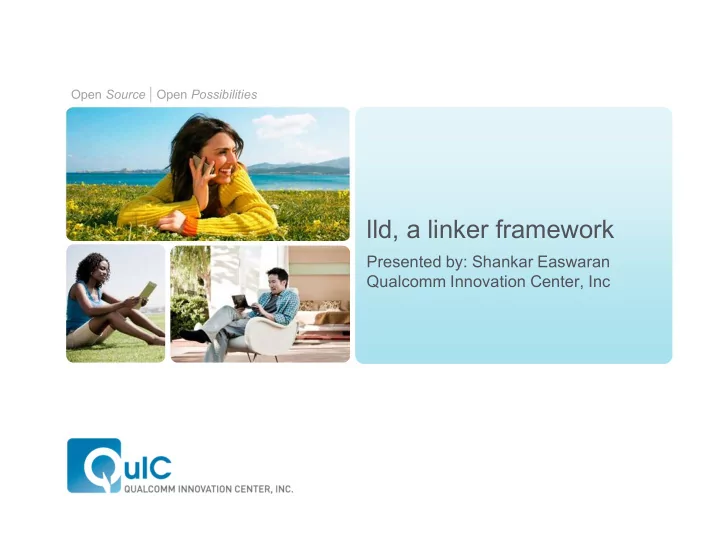

Open Source Open Possibilities lld, a linker framework Presented by: Shankar Easwaran Qualcomm Innovation Center, Inc Open Source Open Possibilities PAGE 1
Motivation Provide a necessary set of reusable libraries to create target specific Linkers. Clang will not have to rely on the system linker on each OS. Increase in optimization opportunities. Provide necessary tools to diagnose linker behavior. Open Source Open Possibilities PAGE 2
Terms Used The term “flavor” is associated with different form of command line styles that lld supports. GNU, Darwin(ld64), Windows(Link) are examples of supported flavors. File Formats specifies types of inputs/outputs supported by lld ELF, Mach-O, COFF, YAML, IR are examples of supported file formats. The term “target” is used as a way to support a particular architecture/ABI in the lld linker. Often associated with a flavor and a file format. Open Source Open Possibilities PAGE 3
Agenda lld features Atom Model Driver Model Lots of details are not in the presentation in the interest of time. Open Source Open Possibilities PAGE 4
lld Features A modular design A set of re-usable libraries that can be used to construct a linker There are Readers/Writers to support each file format ELF, PE/COFF, Mach-O are examples Linking is performed on lld IR which is an internal and format-independent representation. lld is structured around a PassManager that runs passes over the IR The IR is in-memory but can be translated to/from textual (YAML) or binary files aka, Native Files. Features a number of tests, testing linker behavior lld is also asan/tsan clean! Provide a framework to perform experiments! Open Source Open Possibilities PAGE 5
lld – Atom Model The basic model which achieves format-independent linking. The Reader associated with each Input file format converts Input files into Atoms. Atoms contain generic attributes and target specific attributes Generic attributes Name Scope Ordinal Target specific attributes Type Relocations Atom Content Readers can control the layout of atoms Layout-After, Layout-Before references Open Source Open Possibilities PAGE 6
lld – Driver Model The Driver models each flavor. Uses a TableGen based parser to parse command line arguments. The Driver creates a LinkingContext – Encapsulates “what and how” to link – Readers/Writers subclass the LinkingContext to contain additional options InputGraph – Converts command line arguments to a Graph. – Nodes in the InputGraph represented as InputElements. – InputElements are associates with either FileNodes/ControlNodes. » FileNodes represent Input Files and its associated command line attributes » ControlNodes represent a way to control Linker behavior – The InputGraph also controls how input files are resolved and typically controlled by each Flavor. – Contains various utility / diagnostic functions to control/dump information. Open Source Open Possibilities PAGE 7
Final Notes Extend LLVM with a Linker framework! Current Status ~300 tests across Gnu, Darwin, Link flavors – Tested on buildbots too. Address sanitizer and Thread sanitizer Clean! Supports a lot of options on each flavor Highly integrated with LLVM Supports a wide range of options with Gnu/Darwin/Link flavors Yes, a linker that permits you to do a lot of experiments! More status in the next page … Future Debug executables linked with lld across all flavors. Add dynamic linking support on all flavors Add LTO support Update documentation at lld.llvm.org, really behind Open Source Open Possibilities PAGE 8
More Status …. With GNU flavor Link lld using itself (self-host) and run tests – 55% fails (153 failures, 126 passes) Link clang using lld and run tests – 14% fail (935 failures, 5756 passes) There might be a lot of assumptions with the current GNU linkers which needs to be still understood Open Source Open Possibilities PAGE 9
Open Source Open Possibilities • Credits to lld team on making this happen! • Patches Welcome • Thank you! • Questions …. ?? PAGE 10
Recommend
More recommend